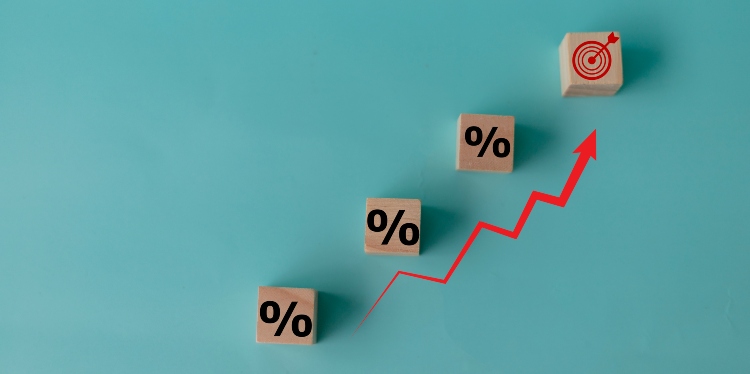The COVID-19 pandemic has changed various aspects of our lives by altering the way we work, shop or educate ourselves. While some changes have had a positive impact, transforming our habits into more time-saving practices, the fluctuations in the market and the resulting financial slumps can hardly be seen as beneficial. One of the results of the pandemic financial crisis was a significant rise in interest rates. What consequences can such a situation have and how can rising interest rates affect our everyday lives?
The interest rate fluctuations
There is no doubt that rising interest rates are the nightmare of those paying off mortgages or other loans. But it’s not just those dealing with banks who should keep an eye on interest rate trends and future forecasts, as the consequences of recession rates go far beyond credit histories.
Looking at the last four years, the most positive development took place in August 2020, thanks to the Bank of England (BoE) cutting the prime rate from 0.25 % to 0.10 %. This change was in response to the pandemic shock and the last record-low in the last four years.
The condition could not be met due to rising inflation, forcing the BoE to review its latest decision with the UK Monetary Policy Committee (MPC), responsible for setting UK interest rates. The decision was in response to rising inflation, which could pose a major threat to the economy.
The year 2023 was supposed to be even more dramatic with the rise to 6.5% by the end of the year, yet with a positive inflation reaction, the predictions decreased. The next five years are most likely connected with the inflation of 5.25% at its peak, and possibly still going down until it reaches 4% at the beginning of 2026.
How is your life affected by high interest rates?
Rising inflation and increasing interest rates have a more significant impact on our everyday lives than anyone can even expect.
Challenges
Strained Borrowers: High interest rates can be a burden for borrowers, especially those new to loans. It means a larger chunk of their money goes towards interest instead of paying down the principal amount. This translates to a longer repayment period and potentially limits their ability to save for other goals. The same principle applies to credit cards with high APRs (Annual Percentage Rates).
Economic Slowdown: Prolonged high rates can lead to a recession by dampening consumer spending and business investment. This weakens the economy and makes it more susceptible to future fluctuations.
Shifting Investments: Stocks may become less attractive with higher interest rates offering a safer alternative. Companies may also face difficulties expanding due to increased debt servicing costs.
Benefits
Boosted Savings: For those already saving, high interest rates offer a welcome increase in returns on savings accounts and fixed-income investments like bonds. This incentivizes saving and provides a more secure income for retirees and those nearing retirement.
Curbed Inflation: High interest rates are often used to combat inflation by making borrowing more expensive and encouraging saving. This can help stabilise prices and protect the value of your savings.
Reduced Spending: While a slowdown in consumer spending can trigger a recession, it can also be a temporary consequence as people adjust to higher borrowing costs. This can eventually lead to more responsible spending habits and a more stable financial system.
Overall, high interest rates require a nuanced perspective. While they can pose difficulties for borrowers and businesses, they also offer benefits for savers and promote price stability.
How to navigate through periods of high interest rates
One of the first steps to be taken when interest rates grow is the analysis of existing loans, including mortgages, auto loans, and personal loans. Ensure you do not overpay and consider refinancing at a lower rate if possible, especially before rates climb further.
Banks and other financial institutions offer debt consolidation, which is a great solution to multiple high-interest debts. When the debts are consolidated into a single loan, the interest rate can be lowered and payments simplified.
If it is possible, pay off high interest debt first, for example, credit card balances. It is the solution to accruing the amount of interest. Whenever it is possible, make extra payments toward your principal balance to reduce the total interest paid.
Higher interest rates are beneficial for your saving accounts so it may be recommended to shift savings to the account with the high-yield account. It is advisable to set up an adequate emergency fund to cover unexpected expenses, ideally 3-6 months’ worth of living expenses.
Your budget can be adjusted, spending habits reevaluated, and unnecessary items removed from your shopping lists. The money saved in such a way can be used for the debt payment or increase of savings.
Track your spending using dedicated budgeting tools to identify your most common expenses and areas where the money can be saved. Seeking professional advice in case when you notice significant flaws in your spending and savings system is recommended, giving you financial stability.
For informed decisions, regularly check XTB’s live blog to keep up to date with the latest interest rates predictions.
David Prior
David Prior is the editor of Today News, responsible for the overall editorial strategy. He is an NCTJ-qualified journalist with over 20 years’ experience, and is also editor of the award-winning hyperlocal news title Altrincham Today. His LinkedIn profile is here.



![7 Best POS Software in the UK [2026 Edition]](https://todaynews.co.uk/wp-content/uploads/2026/02/7-Best-POS-Software-in-the-UK-2026-Edition-360x180.png)









































































